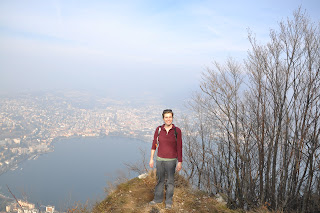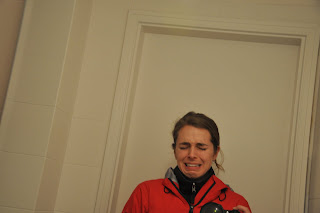Sometimes, I forget to listen to things around me. I forget that I belong to the whole world and not just my small pocket in Berkeley, in my small life, taking up so little space. Sometimes I forget why I travel and that does not serve me well. It serves me well to listen.
Today Amanda Knox’s murder conviction was overturned. She’s probably making her way through a country that hates her, one that she probably used to love, to go back to her wrenched-apart and bankrupt family, all because of her.
Today, Meredith Kercher’s family feels like they lost the last fiber of their late daughter’s life. They lost what they felt they were owed, and today they probably have nothing, and certainly not their daughter back.
Below is something I wrote after my stay in Perugia this past spring. It’s my attempt to listen better.
I sat on the half-lit church steps. Italian and American students were chattering around me, and the fountain gushed continually in front of me. The late sun was slipping behind Perugia’s duomo, and the hillside town was headed into shadow.
I had a few days to spend somewhere after leaving Florence early. A dear friend had recommended Perugia. He said it was the most beautiful city he’d ever seen. In addition to his recommendation, I wanted to see the town for myself. This was the town where Meredith Kercher had been killed and Amanda Knox had been accused.
Meredith Kercher was murdered right before I studied abroad in nearby Florence, Italy. The two pieces of advice I received before I left were 1) Watch out for the Italian men and 2) Don’t kill your roommate, ha ha! Chance would have it that I wound up having a roommate named Meredith, and my first name is Amanda, and it isn’t funny. Amanda Knox is from my hometown and went to the University of Washington. Though I didn’t know her, I felt like I knew what she was probably like.
She probably played sports in the rain in Seattle growing up. She probably studied hard and had a caffeine habit, and she probably preferred Peet’s or Tulley’s to Starbucks. She probably spent her weekends in college working to pay for study abroad. She probably hated doing laundry when she lived in the dorms because the dryer consistently shrunk her t-shirts. Her mom and dad probably worried about her and gave her quick, last-minute kisses before she boarded the plane to Perugia.
And the same was probably true of Meredith Kercher.
With all of this in mind, I decided on Perugia. I was tired of my own study abroad city, so I went to Amanda and Meredith’s.
I wandered the city’s labyrinthine streets that followed the rise and fall of the hills. They curved like spines and opened into larger arteries where students and local Perugians strolled on that Sunday night. The windows burned like candles and Italian faces were bright inside, busy operating behind their stone walls. Tablecloths covered old tables, and children did their homework. American students stumbled past me, giggling, and my shoulder felt cold, the shoulder that Mer—my Meredith—would sometimes lean against as we walked for gelato along the Arno.
I found the café recommended by my guidebook, but I was waved away. The lights blazed inside, and the hours listed on the glass door told me the café was open, but I couldn’t go in. It looked warm, friendly, and a welcome place to sit and see what I thought about this utterly foreign place. And the whole evening felt tense, as if I were on the eve of understanding what had happened. But of course, I wasn’t.
I walked to the grocery store for tea. On the way, I saw planter boxes with early spring flowers. Still lace curtains hung in the windows, and everything was made of stone. The old houses radiated cold. My breath hung in the night air, and even though people were all around me, I felt alone. A different alone than I had felt the rest of my trip. This kind of alone felt like love and kindness and understanding and goodness no longer existed in this place. It wasn’t the people, it wasn’t the buildings, it wasn’t anything. It just was.
Someone had died in this town. But someone had died in every town, everywhere. But a girl—just a girl—had been killed in this town. Someone hated or was scared enough to kill in this town, and that is not everywhere. Maybe I had even walked past the home the two shared. Maybe I walked the route Amanda and Meredith had taken home from school. Something leeched into my bones in Perugia, and I so badly wanted it out.
It’s easy to take sides. It’s easy to think that Amanda killed and sexually assaulted her roommate, Meredith Kercher. It’s easy to think she didn’t. What’s obvious is that no life involved in that awful happening in Perugia will ever be the same. And Meredith Kercher is dead, will always be dead, no matter who is found guilty. There is no separation here.
I don’t know whether she’s guilty or innocent. Maybe it’s some complex combination of the two. But I still feel for her and I still feel like there’s something strange that has yet to be explained, something that happened in Perugia. When asked what would be the first thing she'd do upon her return home, Amanda Knox said she just wanted to lie down in a green field. And Meredith Kercher's mother cried when the verdict was overturned.
When I got back to my hostel, I sat at the table and cried. In the morning, I woke early, took the bus down the hilly street, through the haze, and boarded the train for Florence, on my way far, far away from Perugia. I will not be coming back.

(These two photos do not belong to me, please take note.)

































